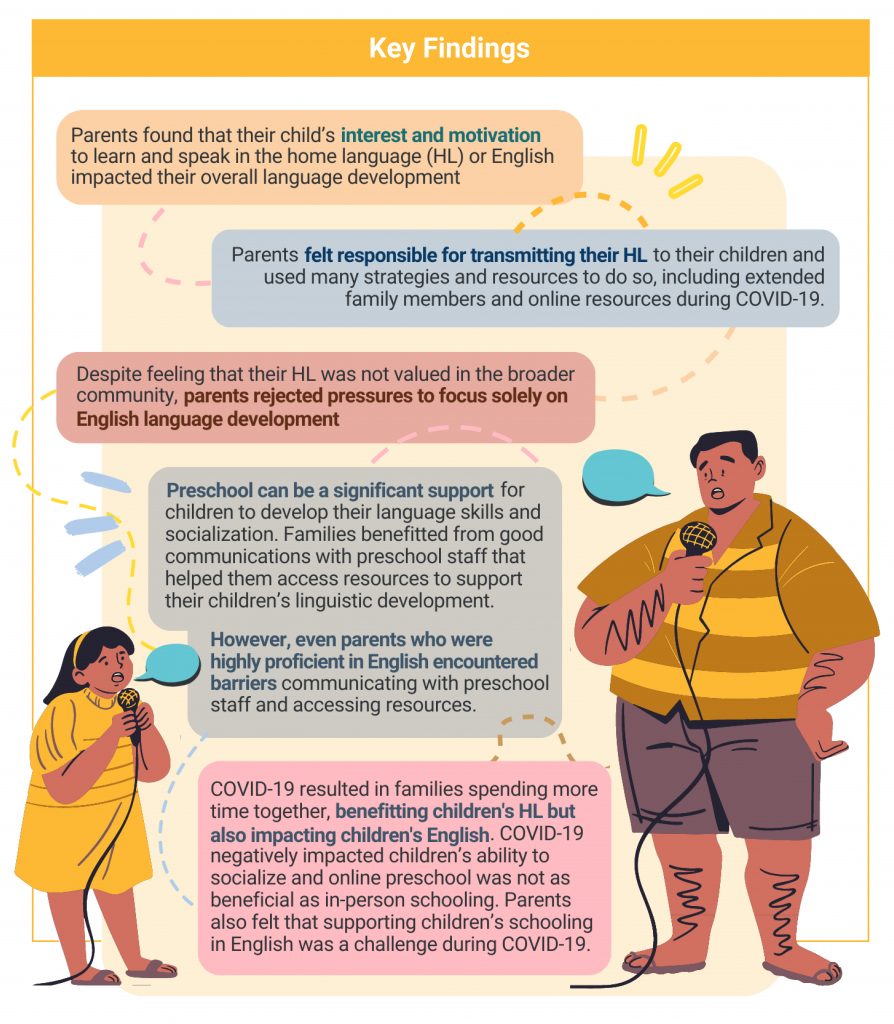Communicating Through COVID-19: Experiences of
Multilingual Families with Refugees Experience
Researchers: Andrea MacLeod1, Yvonne Chiu2, Lucero Vargas2, Natalie Gordon1, Catrine Demers1, Rita Chehayeb3
Affiliation:University of Alberta1, Multicultural Health Brokers, Edmonton2, Multilingual Families Lab3
Research Partner: Multicultural Health Brokers, Edmonton
Keywords: refugee children, refugee families, newcomer children, newcomer families, language development, minoritized language, COVID-19, qualitative methodology, community-based participatory research
Jump to: Full infographic, Methodology, Findings, Recommendations, Publications & Reports, Presentations
Summary
Overview: This study sought to understand newcomer parents’ experiences supporting their children’s language development before and during COVID-19. The study used a community-partnership research model that empowered families and built service providers’ capacity to meet newcomer families’ needs.
Objective:
- To understand what “good communication development” means for parents from diverse language backgrounds who are refugees and newcomers to Canada.
- To understand what barriers and facilitators multilingual families experience in supporting their children’s language development before and during the COVID-19 pandemic.
Research Justification: Research shows that supporting children’s early communication development is essential to their long-term well-being, academic success, and full participation in daily activities. During COVID-19 newcomer families faced additional challenges supporting their children’s communication due to the pandemic restrictions, new stressors, and isolation.
Methodology
Using a community-based participatory approach, the research team co-developed semi-structured interviews questions with Multicultural Health Brokers. They connected with parents of young children who were from the Eritrean and Ethiopian community (n=3), Syrian community (n=3), Mandarin community (n=3), Spanish-speaking parents (n=3), and a multilingual group (n=3). The focus groups were facilitated in the preferred language spoken by parents.
The researchers used thematical analysis to deductively code the interviews according to previously reported themes and Bronfenbrenner’s Bioecological Model. Inductive coding captured emerging themes. Yosso’s Community Cultural Wealth framework was used to understand the strengths and assets used by multilingual families.
Findings
Family-level Factors:
- Parents found that their child’s interest and motivation to learn and speak the home language (HL) or English impacted their overall language development.
- Parents felt responsible for transmitting their HL to their children.
- Their positive attitudes and knowledge towards supporting the HL, English, and multilingualism were beneficial.
- Despite feeling that their HL was not valued in the broader community, parents rejected pressures to focus solely on English language development.
- They identified and used strategies which supported language transmission, including support from extended family members who did not speak English and spending time in their country of origin.
- Parents made use of online resources during COVID-19.
School & Peer Factors:
- Preschool can be a significant support for multilingual children to develop their language skills, identity, and socialization. However, online preschool during COVID-19 was not as beneficial.
- Peers expose children to different languages and help their language development through social interactions.
- Families benefitted from good communication with preschool staff that helped them access resources to support their children’s linguistic development.
- Families in the study experienced barriers communicating with preschool staff and accessing resources despite having at least one parent who was highly proficient in English.
Community-level Factors:
- Having a community of HL speakers supported children’s exposure to their HL and culture and was a source of resources and information.
- Government policy and funding influenced families’ knowledge of and access to services. Family immigration policies also affected family capital.
- COVID-19 resulted in families spending more time together, benefiting children’s HL but also impacting children’s English. COVID-19 negatively impacted children’s ability to socialize. Parents also felt that supporting children’s schooling in English was a challenge during COVID-19.
Recommendations
- Service providers and policy makers would benefit from going beyond simple translations to engaging with communities in language and cultural brokering.
- School systems, teachers, and communities need to help establish meaningful parent-teacher collaboration to support children’s home language development.
- Schools and service providers must value newcomer families’ home language and the strengths and assets they bring.
Publications & Reports
Explore more projects



